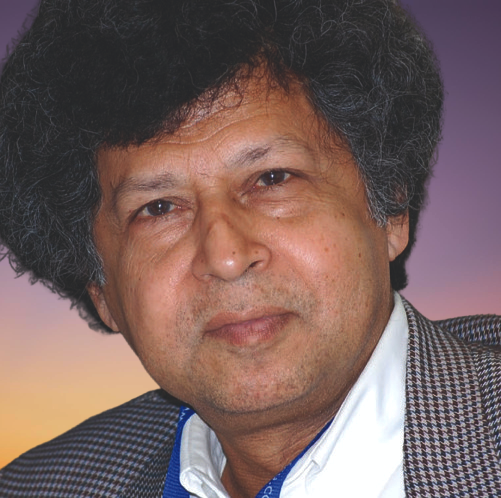Column

A polling official in Chennai, India, puts an indelible ink mark on the index finger of a woman as she arrives to vote in the country’s national election Friday. Photo: AP/UNB
In the past year, three nations, each grappling with varying degrees of authoritarianism, held national elections. The media in these countries is firmly under government control, the judiciary dances to the government's tune, the election commissions lack impartiality, and opposition members face relentless harassment. It would be an understatement to say, in such environments, whether at the national or local level, opposition politicians find survival a challenge.
The First Election: Turkey
Last May, Turkey witnessed an election under the long shadow of President Recep Tayyip Erdoğan, who has been in power for two decades. For the first time, he faced a formidable challenge from an opposition coalition that rallied around economic woes, rampant corruption, and a partisan grip on power. Their candidate, Istanbul's popular mayor Ekrem İmamoğlu, was swiftly charged with corruption and tax evasion. Despite the dubious nature of these charges, Erdoğan's loyal judiciary handed İmamoğlu a three-year prison sentence, disqualifying him from the race. The coalition's alternative, Kemal Kılıçdaroğlu, then bore the brunt of state-controlled media's attacks. According to media reports, in the month leading to the election, national media allotted Erdoğan 32 hours of coverage compared to a mere 32 minutes for Kılıçdaroğlu. With the government's vigilant eyes following them everywhere, journalists faced stringent restrictions and arbitrary imprisonment. The government further tightened its grip on the opposition by criminalizing political donations. Erdoğan, meanwhile, leveraged public funds, announcing pay raises and free gas just weeks before the election. Despite these efforts, he failed to secure 50% of the vote, narrowly clinching victory in a second-round election.
The Second Example: Russia
In March, Vladimir Putin extended his two-decade rule with another six-year term in Russia. Putin's authoritarian tactics are no secret: opponents are sued, imprisoned, poisoned, or even pushed down from high-rise buildings. Civil society is stifled, branded as foreign agents, leaving no room for dissent. The sole opposition figure, Viktor Navalny, was poisoned and later died in Siberian imprisonment under suspicious circumstances. Voting in Russia is compulsory, with government employees required to report their votes and those of their relatives via a special app. Under such an iron grip, Putin's re-election with 87.3% of the vote was a foregone conclusion.
The Third Example: India
Just a week ago, India announced its election results. Despite significant setbacks, Narendra Modi secured a third term as Prime Minister with his coalition's backing. While many hailed this 40-day election involving over 600 million voters as a "festival of democracy," the reality warrants scrutiny.
Opposition politicians in India, much like in Turkey and Russia, are frequently jailed and fined. The Indian Express reports that 95% of investigations launched since 2014 targeted Modi's political opponents. The main opposition leader, Rahul Gandhi, was imprisoned for allegedly insulting the Prime Minister. Delhi's Chief Minister Arvind Kejriwal and Jharkhand's Chief Minister Hemant Soren were both imprisoned on unproven corruption charges, only weeks prior to the election.
Another tactic of Modi's government involves freezing opposition bank accounts. The Congress (I) party, India's principal opposition, had its funds frozen only weeks before the election, crippling their campaign efforts. While opposition finances were seized, Modi's party benefited from hefty donations via "electoral bonds" introduced in 2017, which allowed anonymous contributions. Reports suggest that billions were funneled to the BJP, including from businessmen with criminal backgrounds. An investigative report by the Washington Post revealed that Modi's BJP received millions from known criminals like Mahendra Kumar Jalan, despite numerous allegations and cases against him. The Supreme Court has since declared this bond system illegal.
The Election Commission's impartiality and competence have also come under fire. Tamil Nadu's IT Minister, Palanivel Thiaga Rajan, in a recent article in Frontline magazine, highlighted irregularities in election management and vote counting. He also noted deliberate exclusion of minority, particularly Muslim, voters from lists in Mathura and Gujarat. Despite rules against hate speech, Modi's anti-Muslim rhetoric went unchecked. In Karnataka, NGOs sought legal action against Modi's hate speech, but the Election Commission remained inert.
In essence, whether in Russia or India, electoral systems exist, but they are skewed to ensure incumbents retain in power. This form of "controlled democracy" is far from true democracy.
Nearly two decades ago, Indian-American author and journalist Fareed Zakaria observed that the world was drifting towards illiberal democracy. Writing in Foreign Affairs in 1997, he noted that many governments, though elected, disregard constitutional constraints and violate citizens' rights to cling to power.
There was a time when power was seized with tanks on the streets; now, it is maintained under a democratic veneer. Routine elections are held periodically only to ensure the continuation of those already in power.
Nonetheless, one could still call India's election a "festival of democracy." After a decade in power, Modi's sense of invincibility has been tempered by the voters' will. This election, despite its flaws, stands as a testament to the enduring spirit of democracy.
The writer is a journalist and author based in New York.

























Leave a Comment
Recent Posts
Auspicious beginnings, but a l ...
The newly elected government of Bangladesh is now in office, and the e ...
Caught between tigers and pira ...
Over 10,000 fishermen in the Sundarbans have suspended their fishing a ...
Historic Chawk Bazar comes alive with iftar items on ..
Shaping Young Conservationists: School Conservation ..
Iran has said it has reached an understanding with t ..
New Finance Minister Amir Khosru Mahmud Chowdhury